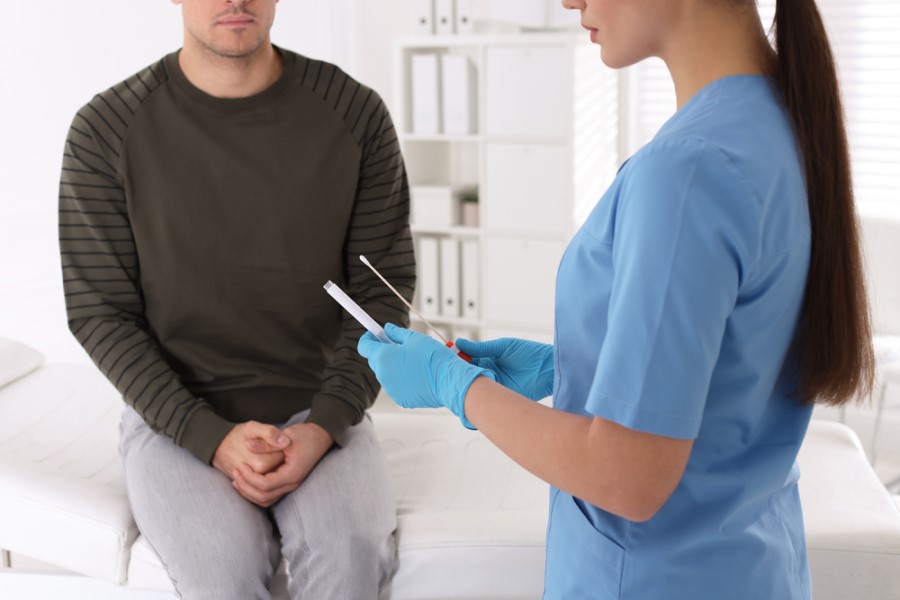STI stands for sexually transmitted infection and describes any condition that is passed from one person to another during sexual contact involving the vagina, penis, mouth, or anus. Also sometimes referred to as STDs (sexually transmitted diseases), STIs are highly contagious and can affect people of any age, background, or sexual orientation. Common STIs include chlamydia, gonorrhea, human papillomavirus (HPV), genital warts, pubic lice, genital herpes, hepatitis B, syphilis, HIV/AIDS, and more.
All STIs can be managed with proper medication, but not all are curable. Becoming infected poses risks to your health as well as to the health of your sexual partner(s), and taking steps to prevent STIs from spreading is vital.
Below, we’ve outlined some proactive ways you can protect yourself and your sexual partner(s) from STIs. For further information and to receive free testing for bacterial and viral STIs, visit us in person at Atwell Centre: Pregnancy Options Support.
Key Takeaways
- STIs (sexually transmitted infections) are conditions that are passed from one person to another during sexual contact. They are not always symptomatic but can pose serious health risks.
- Understanding how STIs spread and making informed decisions accordingly is the first step in reducing STI transmission.
- Preventative measures include the proper and consistent use of condoms, staying up-to-date with vaccinations, and avoiding higher risk behaviours.
- Atwell Centre: Pregnancy Options Support offers free STI testing at our clinics in Hamilton and Oakville, Ontario.
Informed Decision Making
Understanding STIs and how they spread will help you make the most informed decisions to keep yourself safe. Most STIs are transmitted through unprotected sexual contact, so protecting yourself every time you engage in sexual activity is key. In addition, it’s important to communicate with your partner(s):
- Ask your partner(s) if they have any known STIs, when they were last tested, and whether or not they have had unprotected sex with other partners.
- Inform your partner if you have a known STI, any STI symptoms, or have had unprotected sex with other partners.
- If you are diagnosed with an STI, be sure to carefully follow the treatment plan your healthcare provider recommends and ensure that your partner is informed and receives proper medical treatment as well.
Use Condoms
When used properly, condoms can provide protection against sexually transmitted infections. External condoms are most common, but internal condoms may also be used during vaginal intercourse to reduce the risk of STI transmission. External condoms and dental dams can offer protection during oral sex.
To provide effective protection, condoms must be used properly every single time you engage in sexual activity. Learn more about safe condom use here.
Get Vaccinated
You can’t get vaccinated against all sexually transmitted infections, but safe and effective pre-exposure vaccinations do exist for hepatitis A (HAV), hepatitis B (HBV), and human papillomavirus (HPV). The HPV vaccine is routinely recommended for girls and women aged 9-27. In the province of Ontario, hepatitis B vaccination is offered as part of public school-based immunization programs, and hepatitis A vaccination is available to individuals at increased risk for contracting the disease.
Schedule an appointment with your doctor or healthcare provider to ensure you are up-to-date with all vaccinations.
Avoid Sharing Towels
While bacterial or viral STIs cannot be passed on through the sharing of towels, bedding, or clothing, parasitic STIs such as scabies and pubic lice can be contracted in this way. No matter the circumstances, it is never advisable to share personal items with others.
If you experience a rash or itching after sharing a towel, bedding, or clothing, it is crucial to have your symptoms examined and properly treated by a doctor or medical professional.
Get Tested Regularly
While some STIs have obvious symptoms, others may be asymptomatic, especially when they are first contracted. This means it is possible that you or your sexual partner(s) may have contracted (and be passing on) an STI without being aware of it.
For this reason, it is extremely important to undergo regular STI testing. This is especially true if you have had unprotected sex with one or more partners, but also applies to all sexually active people of any age.
If you have questions about STIs or are seeking STI testing and treatment, the compassionate, knowledgeable, and professional staff at Atwell Centre: Pregnancy Options Support are available to assist and support you. Contact us today to book an appointment at our Hamilton or Oakville clinic!
The information provided on the Atwell Centre blog is intended solely for educational purposes and is not a substitute for professional medical advice, diagnosis, or treatment. We strongly recommend that you consult a physician or other qualified healthcare provider for the most up-to-date information and personal medical advice.
If you are experiencing an unplanned pregnancy, need STI testing, or would like post-abortion support, please book an appointment at Atwell Centre. Your health and well-being are our top priorities.

